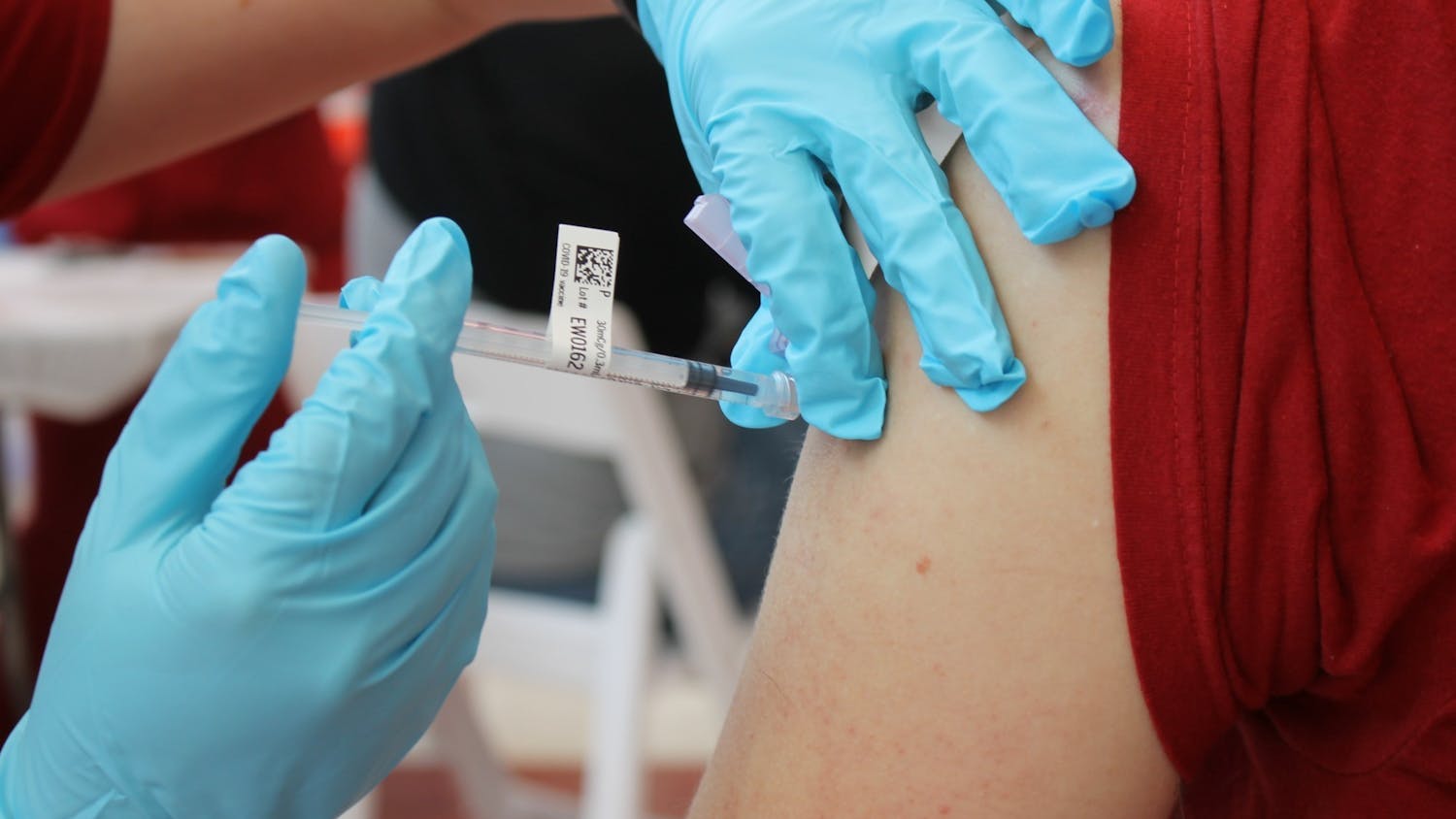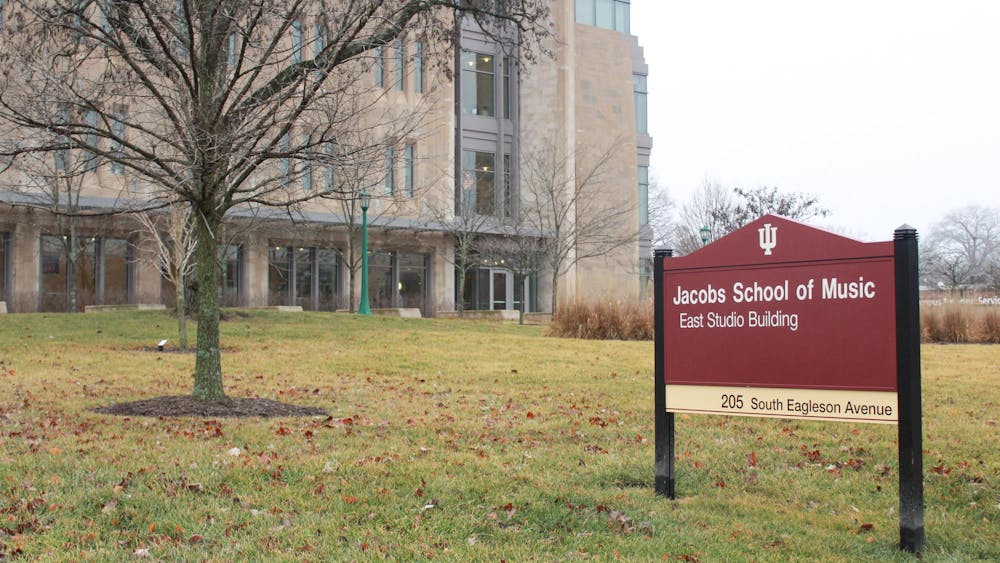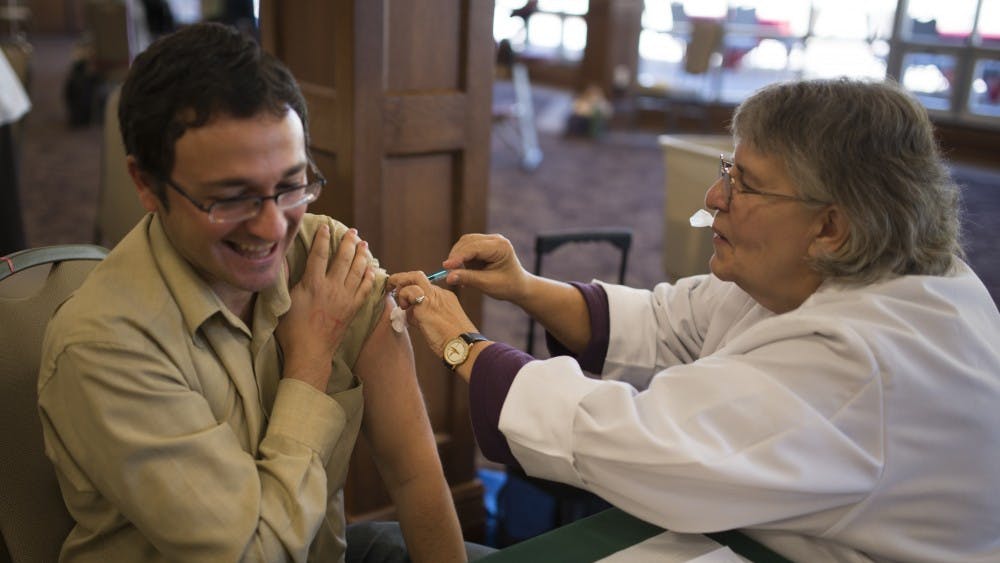It's 9 p.m. and 40 degrees outside, but three men are standing behind a dumpster. Two girls are loitering in the middle of a courtyard. Their hands, torsos and faces are covered. They're talking quietly, standing in a fog of breath and smoke. Even if they weren't hooded or leaning into each other, you wouldn't be able to see their faces. But they aren't doing anything illegal.\n"I'm against smoking in-doors, but as long as it's out here in the courtyard, I think it's fine," freshman Nick Benson said before taking a drag from his cigarette. He averages a 3.2 grade-point average.\nFreshman Katja Sednew agrees that outdoor smoking should be tolerated. \n"I feel like (if we are) 30 feet from a building, people can avoid (smokers)," Sednew said.\nIf anti-smoking advocates were only worried about second-hand smoke, these students might be right. But according to a study by the Indiana State Department of Health's Epidemiology Resource Center, smoking is an anti-status symbol of the poor and uneducated. The study says people with lower socio-economic status are more likely to smoke to cope with the stresses of poverty.\n"I just feel like the government talks about smokers as if we're an underclass," said Julie Singer, an out-of-state freshman from New York. Despite the sentiment, some IU students think smoking helps with their studies.\n"I pay for my own school ... and I like that smoking calms me down and helps me study once in a while," said Troy Michael, a freshman and registered voter.\nEric Wright, director of health policy at the Center for Urban Policy and the Environment at IUPUI, said smokers cost the state upwards of $2 billion a year -- roughly $560 per household. Wright and other IUPUI professors stand behind Gov. Mitch Daniels' proposal to raise the cigarette tax and encourage President Adam Herbert to make IU's campus smoke-free.\n"The $2 billion figure refers to the estimated total direct/indirect costs of smoking," Wright said in an e-mail interview. "Basically, these refer to the medical charges for treatment of the wide array of smoking related conditions … and lost productivity due to disease and illness associated with smoking."\nSick smokers in Marion County alone carry a price tag of $53 million a year, according to Dr. Stephen J. Jay, professor of medicine and public health at the IU School of Medicine.\n"In such a state you've got problems with recruiting businesses into Indiana because they know if they come here they're going to have a workforce (in which) 27 percent are smokers," Jay said. "You've got a workforce in Indiana that is statistically sicker than workforces in other states."\nTo combat this, Jay proposes at least a dollar increase on the tax for cigarettes so that Indiana's tobacco tax will be in line with the national average. Wright and other experts propose a "fair tax" of $7.50 to help pay smokers' $2 billion tab. \nGov. Daniels proposes to raise the tax on cigarettes by at least 25 cents, said Jane Jankowski, Daniels' press secretary.\nJames Walker, a professor of economics at IU, says that very high-priced cigarettes might dissuade new smokers from starting, which would have a greater affect in the long term. But Walker warns of the negative effects of such a high tax increase.\n"Theft of cigarettes would most likely increase and smokers and future smokers may shift to substitutes that have negative impacts on their health," Walker said in an e-mail. "One should ask … are there better ways to reduce smoking voluntarily?"\nJay is a vocal advocate for "de-normalizing" tobacco, a strategy he says should go hand in hand with tax increases. He said it is important to get smoking out of Americana.\n"It's really motherhood, apple pie and tobacco," Jay said. "In the last 20 years we've been effective in de-normalizing tobacco, developing a whole series of strategies to decouple tobacco and social norms."\nJay was influential in IUPUI's decision to ban the use and sale of tobacco products campus-wide. He has also been asked by President Herbert to speak with a task force at IU regarding the introduction of a similar ban in Bloomington.\n"Universities and colleges are realizing that smoking in general on campuses is a big problem," Jay said. "We've chased tobacco companies away from the egregious advertising to little kids, but what they've done is just switched up to college level age. College students today are the targets of the tobacco advertising industry."\nAccording to the Web site for Americans for Nonsmokers' Rights, www.no-smoke.org, 40 colleges in the U.S. have been declared smokefree since IUPUI announced its decision Aug. 14.\nNo further decisions have been made concerning a possible campus-wide smoking ban at IU, according to Elisabeth Andrews, spokesperson for IU media relations.\nBen Hutt, a smoker and former IU student from Toronto, agrees with a tax increase, but not with a ban.\n"I think 10 bucks for a pack of cigarettes is not a bad idea considering we're killing ourselves," Hutt said.\nAmmar Mirza, creator of the Facebook group, "Don't Ban Smoking on IU Campus," disagrees.\n"Shutting it down, making it illegal, that's not the right thing to do," Mirza said. "Things are all right here. We don't mind smoking outside"
Proposed tax would further limit smokers
IUPUI professors say $7.50 per pack covers state costs
Get stories like this in your inbox
Subscribe




